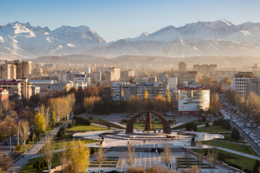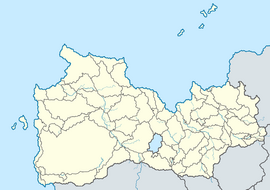Yashkul: Difference between revisions
(Created page with "{{WIP}}{{Infobox settlement |name = Yashkul |native_name = Єшкуль / Яшкюл |native_name_lang = <!-- ISO 639-1 code e.g. "fr" fo...") |
No edit summary |
||
| Line 98: | Line 98: | ||
'''Yashkul''' ({{wp|Help:IPA/English|/jaʃ:kʊl/}}, {{wp|Rusyn language|Soravian}}: Єшкуль; ''Yeshkul'', {{wp|Kalmyk language|Zalyk}}: Яшкюл; ''Yaşkül'') also known historically as '''Eshkul''' (1870{{ndash}}96; 1988{{ndash}}2006) and '''Novokvasisk''' (1896{{ndash}}1988) is the provincial capital and largest city of [[Zalykia]]. With a total metropolitan population of 676,715 as of 2020, it is also the [[Soravia#Major cities|16th largest city in Soravia]]. Yashkul is situated on the [[Kvasy river]], just to the west of the [[Soravia|Shutsk mountains]]. | '''Yashkul''' ({{wp|Help:IPA/English|/jaʃ:kʊl/}}, {{wp|Rusyn language|Soravian}}: Єшкуль; ''Yeshkul'', {{wp|Kalmyk language|Zalyk}}: Яшкюл; ''Yaşkül'') also known historically as '''Eshkul''' (1870{{ndash}}96; 1988{{ndash}}2006) and '''Novokvasisk''' (1896{{ndash}}1988) is the provincial capital and largest city of [[Zalykia]]. With a total metropolitan population of 676,715 as of 2020, it is also the [[Soravia#Major cities|16th largest city in Soravia]]. Yashkul is situated on the [[Kvasy river]], just to the west of the [[Soravia|Shutsk mountains]]. | ||
Early records indicate that Yashkul was settled in the 14th century by Zalyk settlers working under the [[Pavatria|Crown of Pavatria]] as part of the [[Great Western March]]. For most of history, it was a rural farming town that relied on local wheat crops and fish from the river for sustenance. During the [[First Soravian Civil War]], much of Yashkul participated either directly or indirectly in the war. As Soravia industrialised in the late-19th century, thousands of people migrated into Yashkul for industrial work at its large mills situated on the river. The city was granted city status in 1870, and by 1890 the population had grown to over 100,000. The city's growing size prompted the government of [[Eduard Olsov]] to officially rename the city to ''Novokvasisk'' in 1896. | Early records indicate that Yashkul was settled in the 14th century by Zalyk settlers working under the [[Pavatria|Crown of Pavatria]] as part of the [[Great Western March]]. For most of history, it was a rural farming town that relied on local wheat crops and fish from the river for sustenance. During the [[First Soravian Civil War]], much of Yashkul participated either directly or indirectly in the war. As Soravia industrialised in the late-19th century, thousands of people migrated into Yashkul for industrial work at its large mills situated on the river. The city was granted city status in 1870, and by 1890 the population had grown to over 100,000. The city's growing size, coupled with growing concern of illiteracy in Zalykia and the promotion of Soravian in the region, prompted the government of [[Eduard Olsov]] to officially rename the city to ''Novokvasisk'' in 1896. | ||
After provincial borders were redrawn by the [[ZVNP]] in 1924, Novokvasisk was selected as the new administrative capital for [[Zalykia]], after the province's historical centre, [[Nurmgö]], fell under the jurisdiction of neighbouring [[Terekhivka]]. During the [[Great War (Kylaris)|Great War]], the city was a large produce of industrial weaponry for the [[Soravian Army]], and after the war continued to grow its status as an industrial centre in western [[Soravia]]. Many rural migrants from elsewhere in Zalykia migrated into Novokvasisk for work after [[Gabriel Tozulyak|Tozulyak]]'s agricultural reforms in the 1950s and 1960s. During the [[Sostava War]] the city fell under the control of [[Tagai Chulgetei]]'s [[Fathers of Zalykia]], and his assassination in the city is what many historians attribute to the end of the war. In 1988, the city was renamed to ''Eshkul'', and was renamed again by Zalykia's Grand Khural to Yashkul in 2006. | After provincial borders were redrawn by the [[ZVNP]] in 1924, Novokvasisk was selected as the new administrative capital for [[Zalykia]], after the province's historical centre, [[Nurmgö]], fell under the jurisdiction of neighbouring [[Terekhivka]]. During the [[Great War (Kylaris)|Great War]], the city was a large produce of industrial weaponry for the [[Soravian Army]], and after the war continued to grow its status as an industrial centre in western [[Soravia]]. Many rural migrants from elsewhere in Zalykia migrated into Novokvasisk for work after [[Gabriel Tozulyak|Tozulyak]]'s agricultural reforms in the 1950s and 1960s. During the [[Sostava War]] the city fell under the control of [[Tagai Chulgetei]]'s [[Fathers of Zalykia]], and his assassination in the city is what many historians attribute to the end of the war. In 1988, the city was renamed to ''Eshkul'', and was renamed again by Zalykia's Grand Khural to Yashkul in 2006. | ||
Revision as of 19:07, 6 January 2021
This article is incomplete because it is pending further input from participants, or it is a work-in-progress by one author. Please comment on this article's talk page to share your input, comments and questions. Note: To contribute to this article, you may need to seek help from the author(s) of this page. |
Yashkul
Єшкуль / Яшкюл | |
|---|---|
 View of Kalimullin Square in the city's centre, with the Shutsk mountains in the background | |
| Country | |
| Province | Zalykia |
| Voivodeship | Yashkul |
| Settled | 14th century |
| City status | 1870 |
| Government | |
| • Mayor | Khunbish Nokhaev (MZ) |
| Area | |
| • Total | 341.2 km2 (131.7 sq mi) |
| Elevation | 16–171 m (52–561 ft) |
| Population (2020) | |
| • Total | 676,715 (+1.3%) |
| • Census | 668,016 |
| Time zone | UTC-3 (Western Euclean Time) |
| General Postal Code(s) | 712001–712009, 712011, 712015, 712020–712035, 712037, 712040, 712047–712054, 712057–, 712061, 712068, 712081, 712096 |
Yashkul (/jaʃ:kʊl/, Soravian: Єшкуль; Yeshkul, Zalyk: Яшкюл; Yaşkül) also known historically as Eshkul (1870–96; 1988–2006) and Novokvasisk (1896–1988) is the provincial capital and largest city of Zalykia. With a total metropolitan population of 676,715 as of 2020, it is also the 16th largest city in Soravia. Yashkul is situated on the Kvasy river, just to the west of the Shutsk mountains.
Early records indicate that Yashkul was settled in the 14th century by Zalyk settlers working under the Crown of Pavatria as part of the Great Western March. For most of history, it was a rural farming town that relied on local wheat crops and fish from the river for sustenance. During the First Soravian Civil War, much of Yashkul participated either directly or indirectly in the war. As Soravia industrialised in the late-19th century, thousands of people migrated into Yashkul for industrial work at its large mills situated on the river. The city was granted city status in 1870, and by 1890 the population had grown to over 100,000. The city's growing size, coupled with growing concern of illiteracy in Zalykia and the promotion of Soravian in the region, prompted the government of Eduard Olsov to officially rename the city to Novokvasisk in 1896.
After provincial borders were redrawn by the ZVNP in 1924, Novokvasisk was selected as the new administrative capital for Zalykia, after the province's historical centre, Nurmgö, fell under the jurisdiction of neighbouring Terekhivka. During the Great War, the city was a large produce of industrial weaponry for the Soravian Army, and after the war continued to grow its status as an industrial centre in western Soravia. Many rural migrants from elsewhere in Zalykia migrated into Novokvasisk for work after Tozulyak's agricultural reforms in the 1950s and 1960s. During the Sostava War the city fell under the control of Tagai Chulgetei's Fathers of Zalykia, and his assassination in the city is what many historians attribute to the end of the war. In 1988, the city was renamed to Eshkul, and was renamed again by Zalykia's Grand Khural to Yashkul in 2006.
Yashkul is one of Zalykia's oldest continually inhabited cities. It is connected to the rest of Soravia on land by the S15 motorway and Soravian gauge rails. The city's central station serves as a hub for rail travel to Zalykia and north-western Soravia. Soravian airline Aeronovo operates year-round flights to the city's Novorespubliky Airport, a two-runway airport with plans for jumbo jet capacity by 2025. Despite its status as one of Zalykia's premier cities, its population growth is declining as a result of substantial youth immigration to eastern Soravia and elsewhere in Euclea.

